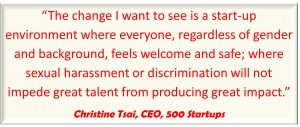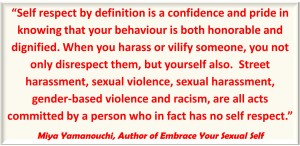Credible claims of harassment in the workplace are occurring so frequently it makes one’s head spin. There are few places in our world that are free of harassment claims, and in several industries and workplaces it’s a veritable epidemic.
The one place we don’t hear much about sexual harassment is in the small business environment – not that it doesn’t exist there, but rather, we just aren’t hearing about it.
From my own experience as a 30-year business owner, I know for certain that harassment, both sexual and abusive, exists in large measure in small businesses. Without the voice to make it heard, though, where no one involved is well enough known, or the impact is only on one or two people, word of it just doesn’t rise to the surface.
In my own company, we had a sexual predator on our staff – whose incidents I knew about for a couple of years – and I’ve regretted my lack of actions ever since.
While this abuser certainly wasn’t physically attractive, several people in our company thought he was charismatic (which I didn’t agree with, and in fact, I thought he was a bully). I think his sense of charisma contributed to the abuses he got away with (see footnote about charisma at the bottom of this blog).
To protect the innocent, I will go into as little detail as possible, but I think it’s important to note the types of abuses this guy made.
The first incident wasn’t sexual harassment in nature, but it forced our bookkeeping staff to be complicit in his sexual escapades. After returning from a business trip to SE Asia, he stopped by our one-person accounting office to tell our bookkeeper of a charge that would be showing up on his corporate American Express card – a charge that he wanted her to treat as a personal charge. He explained that not using his personal VISA card was a totally honest mistake – for a charge at “the Happy Times Escort Service” – and when it came across her desk, he asked her to deduct it from his cash-reimbursed expenses. What he did on his personal time was certainly his own business, but involving our bookkeeper in it was out of line. When she told me of it, I elected not to do anything about it – or even have a talk with him about inappropriate use of our company credit card. (We knew that his wife handled the finances at home, and she almost certainly looked over credit card charges – so this was the real reason he had intentionally used the company card and wanted it handled as part of his cash expenses. It was an indication of how devious this guy was in managing his dalliances.)
Later, when an overnight stay was required to visit a customer site several hours away by car, he rode with our territory sales manager on the evening-before trip. As she was driving, he made increasingly suggestive comments, and then he quickly slipped his hand up her dress. She let him know in no uncertain terms that this wasn’t appropriate, and physically forced him away. The next day she notified our office manager of the incident (being small, we didn’t have anyone designated as HR, so our office manager was the most appropriate person). I was then notified of the incident, and to my everlasting shame, I elected not to do anything about it.
A few months later, this same guy traveled to a remote job site where we had about a half dozen technical staff on a consulting project. He was the manager of the project, and our customer had demanded that a female consultant on our staff be removed from the project as not being sufficiently qualified. A requirement was that our employee had to be told off-site, and since our company didn’t have another project where she could be reassigned, we had no choice but to let her go. A small conference room was rented in a next-door hotel for the termination. After a short meeting – where she was understandably distraught – as he walked her to her car in the parking lot, he physically pinned her against her car, forcibly kissed her on the mouth, and suggested that her trauma could best be handled if she accompanied him to his hotel room. She forcibly pushed him away, and when she went back inside our customer’s facility to clear out her desk, she quietly told a co-worker of the incident and then left. This co-worker told us what had happened a few days later. As soon as I heard about it, I contacted our corporate attorney’s office and spoke at length with an HR lawyer on staff. She instructed me in exactly how to deal with it, but other than to seriously admonish him, I never took it to the level of employment termination.
At this point you have to be wondering why I would let incidents such as this go by – where at least the last two were obviously at a firing offense level. It pains me to admit it, but the guy was responsible for bringing in over 40% of our company’s entire revenue, from consulting contracts that he brought in and directly managed. My company was going through a transition from a business phase that had reached its end of life, and at the time this revenue was keeping us alive as we worked towards a new business direction. Without this business that he brought in, we very possibly wouldn’t have survived. There was also the possibility that if we fired him for the offenses, he could have lured away our consulting staff and then arranged to have the consulting projects re-directed to a new company he would start up. I was between a rock and a hard place, and rather than do what was right, I took the easy way out and let this guy have a pass. (It wasn’t long, though, before he did make a concerted effort to do exactly what I was afraid he would do, and I fired him in a very public way. But to my chagrin, it was without exposing his sexual harassment behavior.)
A couple of years later, when my company was successfully transitioned to its new course, we had another sexual harassment situation (but a different guy). This time, we did everything according to standards. At an annual sales meeting at our company HQ, our out of town employees were booked at a nearby hotel. After a company-sponsored dinner one evening, one of our female technical software staff was returning to the hotel with a co-worker that she only knew slightly (and who was married and lived in the U.K.). As soon as they got in the hotel elevator, he got very close to her, took her hand in his, and suggested that she accompany him to his room. She rebuffed his advances in no uncertain terms, and they went to their separate rooms. The next day she filed her complaint.
By now, our head of Accounting was our designated HR person, and in talking this through with our corporate HR attorney and the guy’s supervisor, we set up a conference call to the U.K., with me and the accountant on our end. It was clearly spelled out to him that we’d learned of exactly what occurred in the elevator, and that it wasn’t just an innocent romantic overture – but that he had crossed the line to sexual harassment. He wasn’t fired, but he was sternly warned that a detailed record of this incident was going into his personnel file and if we ever heard about another attempt he would be fired with cause.

What should we have done differently? Here are some discussion points for your own situations:
- Like every sexual harassment claim being made today, the ones in my company were all unverifiable – where the abuser could have indignantly claimed them not to be true, and in a loud voice made the accuser out to be the offender (sound familiar?). In all of our situations, though, we believed the accuser and not the accused – but except for the last one, we didn’t do what we should have done about them.
Knowing that you’re bound to have similar situations, the suggestion is to have HR plans and procedures in place ahead of time – and commit that you’ll follow them.
- Create harassment guidelines – both sexual and abusive – that are part of your employee handbook (this could be the reason you need to have an employee handbook, at least the rudimentary parts of one). Clearly state the behaviors that will not be tolerated, and state that actions will have consequences, including termination of employment.
- At company meetings and get-togethers, develop dialogue aimed at preventing and responding to sexual harassment, assault and other forms of harassment.
- Host conversations, including at weekly/monthly company meetings, about preventing and addressing sexual harassment and abusive behaviors. These conversations don’t have to be formal lectures, but they should let each and every employee know that you won’t tolerate this behavior.
* Harvard Business Review had a good article in the November 16, 2012 issue, titled The Dark Side of Charisma, and how it plays out in leadership roles. The article explains how someone who knows (or has been told) they are charismatic develops a perspective that they can charm their “followers” into doing what they want – and the fact that charisma is important in leaders, but it can lead to bullies and abusers.






Sorry, comments are closed for this post.